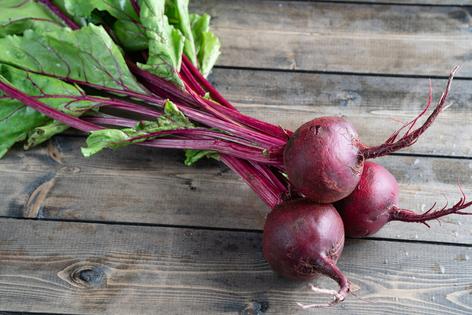6 nutritional benefits of beets you probably didn’t know
Published in Health & Fitness
Plenty of people cruise by beets at the grocery store or consciously avoid them because they’re not sure what to do with them. But there’s no reason to be intimidated by this root vegetable just because it looks a little different or is unfamiliar. Beets, or beetroots, are definitely worthy of a second look — they’re not only delicious, but also are jam-packed with powerful nutrients. They boast fiber, nitrates (the good kind), folate, potassium, magnesium and vitamin C, just to name a few. And to make things easier, canned beets, roasted beets and beet juice are all excellent options for a beet-fueled health boost.
Beets come in several different varieties. Red and purple beets are high in an anti-inflammatory compound known as betalains (a phytonutrient found in plants), specifically betacyanins, which give beets their deep red color. Then there are yellow and golden beets that contain a different group of betalains, called betaxanthins. Finally, you can also find beet greens, the leafy tops of the beet plants that are totally edible and offer loads of B vitamins.
Here are a few more nutritious reasons to make beets a regular part of your diet.
1. Beets play a role in lowering blood pressure.
Beets help your heart by lowering blood pressure. “[They] contain inorganic nitrates that the body converts to nitric oxide. Nitric oxide helps lower blood pressure by dilating the blood vessels,” says Jennifer Weis, RD, LDN, founder and owner of Jennifer Weis Nutrition.
2. Beets are high in fiber.
Beets are very fiber-rich. Fiber not only helps your gastrointestinal tract stay regular, but also helps control blood sugar and even lower cholesterol levels. One cup of beetroots has 3.4 grams of fiber. (The American Heart Association recommends a daily intake of 25 grams of fiber.)
3. Beets may give your brain a boost.
Beets boast nitrates — not the kind of nitrates found in some lunch meats, but the kind that turns into nitric oxide when consumed, which increases blood flow to the heart and brain by widening the blood vessels. This increased blood flow to the brain essentially helps keep it young and healthy.
4. Beets can keep your kidneys and liver healthy.
Beets have a detoxifying component called phytonutrients. These phytonutrients increase enzymes that help detox your liver and decrease stress on your kidneys. Keep in mind, however, that beets are also rich in compounds called oxalates, which can contribute to kidney stones. So eat beets in moderation if you’re prone to kidney stones.
5. Beets may help reduce inflammation.
If you’re plagued by inflammation, consider beets as a possible solution, as this veggie has proven to help reduce inflammation due to its antioxidant content (thanks, betalains) and other properties. In one study, researchers examined gum inflammation, headaches and recurrent pain that interrupted participants’ sleep and concluded that beetroot is a highly effective anti-inflammatory when all conditions improved.
6. Beets may improve exercise performance.
Drinking beetroot juice is thought to increase the body’s nitric oxide levels, which can help improve blood flow, cardiorespiratory endurance and muscle and lung function. If you’re a fan of high-intensity exercise, you’ll like these study results. In one study, researchers found that subjects who supplemented with beet juice had an increase in exercise tolerance and lower “rate of perceived exertion” than those who did not consume beet juice.
(Real Simple magazine provides smart, realistic solutions to everyday challenges. Online at www.realsimple.com.)
©2022 Meredith Corporation. Distributed by Tribune Content Agency, LLC.







Comments